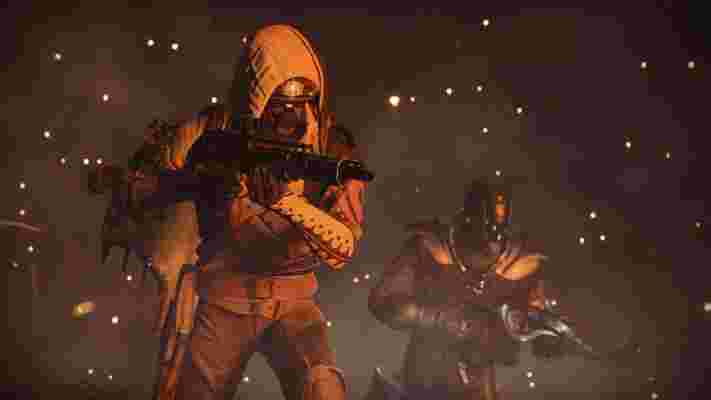It’s a question that’s popped up on message boards, in YouTube videos, across Discord chats, and likely as the 9:00 a.m. topic of many hushed game developer board room meetings:
“Is Anthem the Destiny-killer?”
Bungie and Bioware (EA), two studios known for mega-hits such as Halo and Mass Effect, respectively, are household names to even casual gamers, drawing in players based on their brand as much as their product. Each has a long history with a respectable record and thousands of devoted fans. So when Anthem was first hinted at in 2014, the question wasn’t whether or not the Bioware title would make a profit, but how high the new IP would sit in the halls of gaming reverence.
From up on high, Bungie knows those halls quite well. Still running off goodwill from the Halo series, the studio released Destiny in 2014, an ambitious, genre-defining multiplayer epic. The game’s combination team shooter-RPG play style was arguably one-of-a-kind, and while many have attempted to replicate their feel, Bungie’s two titles in this series have kept well ahead of contenders. Despite considerable problems, 2017’s Destiny 2 remains the reigning champ in its weight class, and it’s still evolving and producing .
On Bioware’s end, it was not initially apparent what their new IP was all about – developers are known for being vague in the early stages when a game begins to formulate in a chrysalis of concept and code. Yet, when the first sneak peaks and screen captures were released last year, the community began to see what was brewing inside, and boy, did it seem familiar .
When one begins to describe the ever-approaching Anthem, the parallels become all too obvious . Like Destiny and Destiny 2, Anthem is clearly a loot-and-shoot, open-world MMO dipping into role-playing elements and class dynamics, where persistent characters progress largely through gear acquisition and upgrades – the best of which are acquired through cooperative play. As an in-genre alternative, Anthem checks all the same boxes.
Further, the thematic comparisons are strong, and stronger with each new bit of Anthem info we hear. To be clear, many contemporary game series make use of the post-apocalyptic setting to create an atmosphere of intrigue and mystery, or an environment fraught with danger. Some of these games focus on advanced technology as a means of progression and protection. Some do all of this better than others . But an expansive, post-apocalyptic sci-fi world where players tech-up and team-up to defend humanity against large-than-life otherworldly threats? Well, it’s a niche, but I can think of one popular little game…

And that game is hurting . Micro-transactions from dawn to dusk . Arbitrary, hidden experience barriers. Loot stagnation . Gameplay that is simply boring . (But mostly the micro-transactions .) The problems are almost as popular as the game itself and, according to many , Destiny may have already vacated its throne long before Anthem even arrives:
So, with such a clear path to victory in front of it, and the king crumbling under the weight of the crown, will Anthem succeed to capture a skeptical player base?
As one player put it to us, “Don’t do what Destiny 2 did, and you win.”

In the EA’s E3 presentation this summer, nothing was done to diminish first-blush comparisons — in fact, they actually seem invited. As player frustration with Destiny 2 goes mostly unanswered, Bioware developers are quick to point out how its new baby very specifically and conveniently lacks all those same frustrations . The studio continues to engage with both content creators and the general public to provide assurances that this game may look like Destiny 2, but let’s be clear that it ain’t :
This kind of pointed messaging may not just be the developers’ playing cute and coy during promotion; it’s rumored that there is a lot riding on Anthem’s success , which necessarily depends on hitting Bungie where it hurts.
Still, make no mistake: Bioware is taking a risk, and they have stumbled before . And while a miss or two won’t sink a company, Anthem is definitely deeper into uncharted territory than Bioware has gone before. A studio that is best known as for producing story-driven, single-player games, with an emphasis on writing, voice-acting and overall plot, has never had to concern itself too greatly with the idea of a competitive twitch gameplay experience, an element that was critical to Destiny’s initial success. Can they prove to be adept at both?
Very possibly. First gameplay impressions have been promising , and the studio itself seems to be ever mindful of who they are . Both will be important. Whether Destiny puts up a fight or fades before Anthem’s arrival on the scene, Bioware will need to learn from Bungie’s mistakes by harnessing the goodwill of the players through delivery of solid, fresh content; keeping to promises made about costs and DLC structure; staying engaged with the community about possible changes; and – above all – creating a game that enthusiasts will legitimately enjoy playing.
More from Softonic
The top 10 free-to-play MMORPGs you should be playing right now
3 ways to get better at Overwatch
The 10 best games on Playstation Now
Top 5 Battle Royale Games